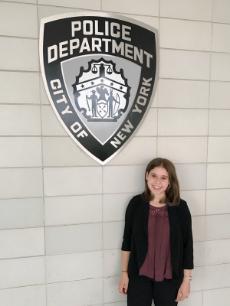Coursework to police work: Muhlenberg seminar prepares Ashley Kemper '18 for NYPD internship
The insights Ashley Kemper '18 developed in a Muhlenberg seminar helped her contribute to the team at the NYPD police commissioner's office.By: Meghan Kita Friday, September 8, 2017 08:45 AM
 Ashley Kemper '18 conducted an internship with the NYPD, helping to strengthen the organization's community relationships. Photos courtesy of Ashley Kemper
Ashley Kemper '18 conducted an internship with the NYPD, helping to strengthen the organization's community relationships. Photos courtesy of Ashley KemperFor Ashley, a psychology and English major, law enforcement is the family business: Her grandfather was an NYPD officer, her father is an NYPD chief and her brother is a police cadet. “It kind of runs in my blood and has always been on my mind because it’s been surrounding me forever,” Ashley says.
So when she found an opportunity at the NYPD police commissioner’s office while browsing for summer internships, it felt natural to apply. And what helped her succeed when she landed that internship was the understanding she gained in Muhlenberg’s Contemporary Racism seminar, led by Connie Wolfe, associate professor of psychology.
“I worked with the counsel to the police commissioner. Right in the beginning of my internship, she asked me what I knew about contemporary issues going on with policing, and I was familiar with the current events we spoke about in Connie’s class,” Ashley says. “She asked if I was familiar with Michelle Alexander’s ‘The New Jim Crow,’ and I had read excerpts from it in Connie’s class.”
 Ashley spent the summer working on projects related to neighborhood policing: “That means trying to do outings and events so that the community and the police become more of one big community, rather than creating a divide,” Ashley says. She did preliminary research on pilot tests, wrote briefings on empirical studies—a skill she developed through her courses as a psychology major—and contributed to an effort to put ATMs in police precincts to encourage routine interactions between officers and the public.
Ashley spent the summer working on projects related to neighborhood policing: “That means trying to do outings and events so that the community and the police become more of one big community, rather than creating a divide,” Ashley says. She did preliminary research on pilot tests, wrote briefings on empirical studies—a skill she developed through her courses as a psychology major—and contributed to an effort to put ATMs in police precincts to encourage routine interactions between officers and the public.
Wolfe hopes Contemporary Racism students like Ashley emerge from the course with a better ability to listen to and understand discussions about race and racism. "I want students to understand the psychological processes influencing people living in a racist society," Wolfe says, "but I also want them to be able to talk about and apply what they've learned outside of the classroom in whatever 'real-world' contexts they find themselves in."
Ashley worked closely with people of various races, backgrounds and positions in the police commissioner’s office. She felt better equipped to be a part of this diverse team thanks to the experiences she had in Wolfe’s classroom at Muhlenberg.
“I truly believe that I wouldn't have excelled during my internship if I had done it before taking Connie's class, since race is so intertwined in police work and since it can be a very taboo and difficult subject of discussion,” Ashley says. “The way that Connie formed the class afforded me the tools to discuss the subject of race in a comfortable and intellectual way.”
